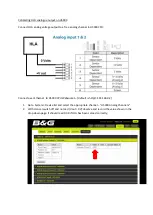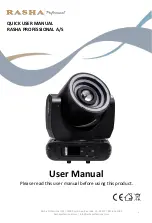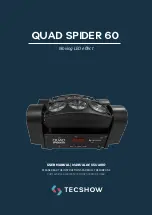
CIRRUS HD-OCT User Manual
2660021169012 Rev. A 2017-12
Appendix
A-3
• Normal visual field, indicated by a Glaucoma Hemifield Test within normal limits, and
MD and PSD > 5% probability level.
Data Collection
284 subjects were qualified as normal subjects and enrolled in this study. 284 subjects
were qualified for the RNFL database while 282 subjects were qualified for the Macula
normative database (poor scan quality disqualified the macula scans from two subjects).
For the RNFL normative database, each eye was scanned three times with the Optic Disc
Cube 200x200 scan. For the macula normative database, each eye was scanned three
times with the Macular Cube 200x200 scan. The Macular Cube 512x128 was scanned once
per each eye.
The CIRRUS RNFL and Macula databases do not have subjects with refractive errors
outside the –12.00 D to +8.00 D range. Therefore, the normative limits for subjects with
refractive errors outside the –12.00 D to +8.00 D range should be used with caution.
Scan Selection Criteria
The scans were reviewed for image quality. One best quality scan for each scan type was
chosen for each subject per eye. Scans having the following characteristics were excluded
from the normative database:
• Signal Strength of 5 or lower.
• Large eye motion during image acquisition, resulting in a saccade that was within the
central 80% of the scan area.
• Area of data loss greater than 10% at the edge of the scan area.
• Presence of floater(s) obscuring macular area on Macular Cube scans or measurement
circle on Optic Disc Cube scans.
In practice, clinicians and operators should quantitatively and qualitatively review scans
before comparing them to the CIRRUS RNFL or Macula normative databases. The
normative limits for scans that have poor scan quality should be used with caution.
Database Population
The CIRRUS RNFL and Macula normative databases were developed utilizing 284 subjects
(aged 19–84) and 282 subjects (aged 19–84); respectively. These normative databases
have a similar gender distribution (134 males, 150 females and 133 males, 149 females;
respectively). Ethnicity breakdown of the CIRRUS RNFL and Macula normative databases is
as follows: 43% Caucasians, 24% Asians, 18% African American, 12% Hispanic, 1%
Indian, and 2% mixed ethnicity.
Results revealed that the mean difference in the average thickness between any two race
groups is within 6
μ
m. Caucasians have thinner mean average thickness, superior quadrant
average, and inferior quadrant average. Asians seem to have thinner mean nasal quadrant
average and thicker temporal quadrant average. The largest difference in the RNFL
thickness between two race groups is for the temporal quadrant average between Asian
and African American, with a difference of 16
μ
m.
Summary of Contents for CIRRUS HD-OCT 500
Page 1: ...2660021156446 B2660021156446 B CIRRUS HD OCT User Manual Models 500 5000 ...
Page 32: ...User Documentation 2660021169012 Rev A 2017 12 CIRRUS HD OCT User Manual 2 6 ...
Page 44: ...Software 2660021169012 Rev A 2017 12 CIRRUS HD OCT User Manual 3 12 ...
Page 58: ...User Login Logout 2660021169012 Rev A 2017 12 CIRRUS HD OCT User Manual 4 14 ...
Page 72: ...Patient Preparation 2660021169012 Rev A 2017 12 CIRRUS HD OCT User Manual 5 14 ...
Page 110: ...Tracking and Repeat Scans 2660021169012 Rev A 2017 12 CIRRUS HD OCT User Manual 6 38 ...
Page 122: ...Criteria for Image Acceptance 2660021169012 Rev A 2017 12 CIRRUS HD OCT User Manual 7 12 ...
Page 222: ...Overview 2660021169012 Rev A 2017 12 CIRRUS HD OCT User Manual 9 28 ...
Page 256: ...Log Files 2660021169012 Rev A 2017 12 CIRRUS HD OCT User Manual 11 18 ...
Page 308: ...Appendix 2660021169012 Rev A 2017 12 CIRRUS HD OCT User Manual A 34 ...
Page 350: ...CIRRUS HD OCT User Manual 2660021169012 Rev A 2017 12 I 8 ...
Page 351: ...CIRRUS HD OCT User Manual 2660021169012 Rev A 2017 12 ...
















































